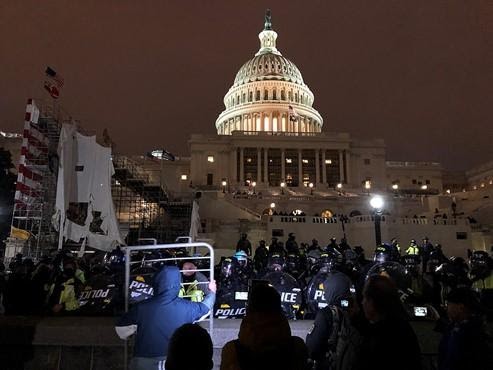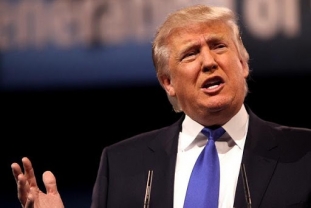 By Miriam Raftery
By Miriam Raftery
Photo, left: Capitol under heavy security at nightfall on Jan. 6, after the attack
February 21, 2021 (Washington D.C.) – On February 13, 57 Senators including seven Republicans voted to convict Donald Trump of inciting the violent attack on the U.S. Capitol on January 6. But the action fell 10 votes short of the two-thirds margin needed for conviction.
Yet even some Republicans who voted for acquittal issued harsh statements condemning the President’s actions as impeachable, saying they voted for acquittal only because they believed convicting a President after he left office would be unconstitutional.
In a blistering speech on the Senate Floor, Senate Minority Leader Mitch McConnell, the highest ranking Republican, said Trump was “practically and morally responsible” for the attack after the mob was “fed wild falsehoods” by Trump. “The leader of the free world cannot spend weeks thundering” about election theft and then “feign surprise when people who hear him do reckless things,” McConnell admonished.
Though he voted to acquit on constitutional grounds, McConnell said Trump committed a “disgraceful dereliction of duty”, not ordering any help even after the attack began. McConnell suggested the President could be charged with crimes or sued to hold him accountable for the insurrection which killed several people including a Capitol policeman, wounding 140 other officers.
“President Trump is still liable for everything he did while he was in office, as an ordinary citizen, unless the statute of limitations has run,” McConell said, adding that Trump “didn’t get away with anything yet. Yet. We have a criminal justice system in this country. We have civil litigation. And former presidents are not immune from being accountable by either one.”
The impeachment prosecution’s case
The Impeachment managers opened with a chilling video of the capitol attack and Trump’s pre-attack rally at which the prosecution contended that Trump incited the armed mob to violence. Later in the trial, prosecutors showed surveillance videos not previously seen by the public with disturbing images of assaults on police officers, also showing how close the mob came to reaching Vice President Mike Pence and Senator Mitch Romney, among others. Chants of “death to Pence” and a gallows set up outside the capitol, as well as communication between some attackers discussing gassing legislators in an underground tunnel, made clear how dire the threats of assassination were.
"When his mob overran and occupied the Senate and attacked the House and assaulted law enforcement, (Trump) watched it on TV like a reality show," lead House impeachment manager Rep. Jamie Raskin stated "He reveled in it. And he did nothing to help us as commander in chief. Instead, he served as the inciter in chief, sending tweets that only further incited the rampaging mob."
The prosecutors also admitted evidence by Republican Congresswoman Jaime Herrera Beutler recounting a telephone conversation that she said House Republican Leader Kevin McCarthy told her he had with Trump during the Jan. 6 assault at which the mob stopped to halt certification of election results. She said McCarthy pleaded with Trump to call off the mob and send help, but Trump refused – even knowing of the violence ongoing at the Capitol. Trump told McCarthy, “Well, Kevin, I guess these people are more upset about the election than you are,” Herrera Beutler said in the statement.
Trump never sent in the National Guard, which was ultimately dispatched by Vice President Pence. Hours after the attack began, Trump posted a video telling rioters to leave the Capitol but voicing support for the insurrectionists, stating, “We love you, you’re very special.”
The impeachment defense case
Trump’s lawyers argued that impeachment after Trump left office was unconstitutional, but the full Senate voted to allow the trial to continue, with the majority finding it constitutional.
Trump was impeached by the House before leaving office, but then-Senate leader Mitch McConnell refused to call the Senate back from recess to hold a trial, which could not commence until after President Biden was inaugurated. Although President Ulysses S. Grant’s Secretary of War was impeached after resigning office amid a bribery scandal, establishing a precedent, he was also acquitted over constitutional concerns. Constitutional scholars are split on the issue.
 File photo, left: Donald Trump, by Gage Skidmore
File photo, left: Donald Trump, by Gage Skidmore
The Trump defense team further argued that Trump’s words were protected as free speech and moreover, showed a video montage with examples of many Democrats using words like “fight” though not in the context of addressing an armed mob intent on disrupting an election tally.
Trump's attorney Michael Van der Veen argued that the former president's comments on january 6 were "ordinary political rhetoric" that is "virtually indistinguishable from the language that has been used by people across the political spectrum for hundreds of years."
The defense lawyers also argued that since some of the insurrectionists had premeditated their crimes, Trump’s speech the morning of the attack could not be responsible. Prosecutors countered that months of Trump firing up his supporters with false claims of election theft was akin to lighting a match on dynamite.
Although the vote fell 10 short of convicting Trump, many of those who voted against impeachment said they did so solely because they believed impeachment after the President left office would be unconstitutional.
View evidence: All of the exhibits presented in the Senate trial
Reactions to acquittal from Trump and Biden
Former President Donald Trump issued a statement after acquittal in his second impeachment trial blasting the proceeding as a witch hunt.
 "It is a sad commentary on our times that one political party in America is given a free pass to denigrate the rule of law, defame law enforcement, cheer mobs, excuse rioters, and transform justice into a tool of political vengeance, and persecute, blacklist, cancel and suppress all people and viewpoints with whom or which they disagree,” he said.
"It is a sad commentary on our times that one political party in America is given a free pass to denigrate the rule of law, defame law enforcement, cheer mobs, excuse rioters, and transform justice into a tool of political vengeance, and persecute, blacklist, cancel and suppress all people and viewpoints with whom or which they disagree,” he said.
Trump added, ”I always have, and always will, be a champion for the unwavering rule of law, the heroes of law enforcement, and the right of Americans to peacefully and honorably debate the issues of the day without malice and without hate."
President Joe Biden said Trump was guilty of a “disgraceful dereliction of duty” regarding the attack that killed a Capitol police officer and several insurrectionists, also injuring 140 police officers. He praised those who “demonstrated the courage to protect the integrity of our democracy – Democrats and Republicans, election officials and judges, elected representatives and poll workers – before and after the election.”
 Photo, right: President Joe Biden; Creative Commons image by SA-NC
Photo, right: President Joe Biden; Creative Commons image by SA-NC
President Biden added, “This sad chapter in our history has reminded us that democracy is fragile. That it must always be defended. That we must be ever vigilant. That violence and extremism has no place in America. And that each of us has a duty and responsibility as Americans, and especially as leaders, to defend the truth and to defeat the lies. That is how we end this uncivil war and heal the very soul of our nation. That is the task ahead. And it’s a task we must undertake together. As the United States of America.”
Civil suit filed seeks to hold Trump and militia groups accountable
It takes only a majority vote for a jury to find defendants responsible for damages in a civil lawsuit, based on a preponderance of the evidence – a far easier standard to meet than an impeachment conviction requiring two-thirds of Senators to agree.
Now a civil lawsuit has been filed against Trump, his attorney Rudy Giuliani, the Proud Boys and Oath Keepers over the capitol attack which sought to stop Congress from certifying presidential election results through threats, violence and intimidation. Numerous leaders and members of these groups have been arrested and charges include conspiracy charges.
The suit contends that they violated the 1871 Ku Klux Klan Act, which prohibits any actions aimed at preventing congress from carrying out its duties. The Reconstruction era statue was specifically meant to protect against conspiracies to impede Congress, after Southern legislators faced threats and intimidation.
The lawsuit has been filed by Congressman Bennie Thompson, a Mississippi Democrat and Chairman of the House Homeland security Committee as an individual represented by the NAACP and the civil rights law firm Cohen Milstein Sellers & Toll. Filed in U.S. District Court in Washington D.C., the suit
“Jan. 6 was one of the most shameful days in our country’s history, and it was instigated by the president himself,” Thompson said. “His gleeful support of violent white supremacists led to a breach of the Capitol that put my life, and that of my colleagues, in grave danger.”
Thompson and other legislators put on gas masks as they were whisked out of the Capitol to shelter in a nearby building with staffers and families present while the violent mob ransacked the capitol, assaulted police officers and threatened to murder elected officials.
 Illustration, right, originally published in Harper’s Weekly, shows three KKK members arrested for murdering a family in 1871, the year the Ku Klux Klan Act was enacted.
Illustration, right, originally published in Harper’s Weekly, shows three KKK members arrested for murdering a family in 1871, the year the Ku Klux Klan Act was enacted.
The Ku Klux Klan Act of 1871 has been used many times through the years in civil suits to expose the financial backers of hate groups and dismantle them, such as the suit that shut down the Aryan Nation’s compound in Idaho in 2001.
The civil suit, if successful, could potentially hold Trump and the militia groups financially responsible for the death and injury of capitol police officers and others, as well as for costs to repair damage to the Capitol and enhanced security costs resulting from the violent attack.







Comments
A view from the other side.